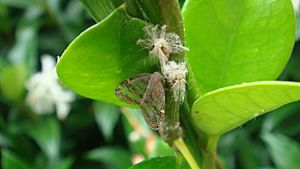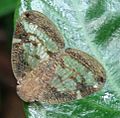Passionvine hopper facts for kids
Quick facts for kids Scolypopa australis |
|
|---|---|
 |
|
| An adult and two nymphs | |
| Scientific classification | |
| Kingdom: | |
| Phylum: | |
| Class: | |
| Order: | |
| Suborder: |
Auchenorrhyncha
|
| Superfamily: | |
| Family: |
Ricaniidae
|
| Genus: |
Scolypopa
|
| Species: |
S. australis
|
| Binomial name | |
| Scolypopa australis (Walker, 1851)
|
|
The Scolypopa australis, often called the passionvine hopper, is a type of insect. It belongs to the Ricaniidae family of planthoppers. These insects are originally from Australia but have also moved to New Zealand.
Even though they are called "passionvine hoppers," they don't just live on passion vines. You can find them on many different plants. This includes kiwifruit and lantana plants.
Contents
What is a Passionvine Hopper?
Passionvine hoppers are small insects. As adults, they are about 5–6 mm long. They are brown and have wings that you can partly see through. To some people, they might look a bit like a moth. They walk in a very special way, sometimes described as "like a ballerina".
Young Passionvine Hoppers
The young passionvine hoppers are called nymphs. They are about 5 mm long and do not have wings. People sometimes call them "fluffy bums" because of their unique appearance.
How They Eat and Move
Like all planthoppers, they use their mouths to suck plant sap from plants. This sap is their food. When they eat, they leave behind a sticky, sweet liquid called honeydew. Bees often collect this honeydew. Sometimes, this honeydew can make the honey produced by bees unsafe for humans to eat.
If a passionvine hopper feels threatened, it will quickly hop off the plant. They do this with a fast, snapping movement.
Where Passionvine Hoppers Live
The passionvine hopper is native to Australia. This means they naturally come from Australia. However, they were introduced to New Zealand in 1876.
In New Zealand
In New Zealand, there are over 40 different kinds of planthoppers. Most of these are native to New Zealand. But some, like the passionvine hopper, were brought from Australia. Other Australian planthoppers found in New Zealand include the Siphanta acuta (green planthoppers), Achilus flammeus (red fingernail bugs), and Anzora unicolor (grey planthoppers).
Passionvine hoppers are a common pest in gardens across New Zealand. They are also found in forests that are growing back after being cut down. During the summer and autumn, you can find many of them, especially north of Nelson.
Impact on Plants
Passionvine hoppers can sometimes cause problems for plants. They are thought to be a vector for a plant disease. This disease is called 'sudden decline'. It is caused by a tiny organism called Phytoplasma australiense. This disease has affected the native cabbage tree (Cordyline australis).
Gallery






